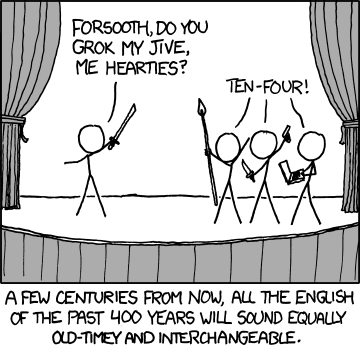
Biggles eventually escaped from the Iranian Secret police by standing outside his hotel and catching the nine o’clock bus to Teheran. He found himself sitting at the back of the bus, between a flock of goats and an enormous woman who ate nothing but fried chicken. To Biggles consternation, all of the busses occupants’ -including the driver- spent the entire journey turned around in their seats, asking him about British soap operas, and most importantly the difference between Coronation and Ramsay Streets.
“But how can you people even have heard of Coronation Street?” Biggles shifted uncomfortably as chicken-fat dripped on one shoulder and goats peed on the other.
“Coronation Street is the greatest art form that is exported to the Middle East,” one learned bearded old woman explained.
“It is?” Biggles said more in amazement than inquiry. “Haven’t you heard of Shakespeare?”
“Oh yes,” she wheezed, “but only in Coronation Street are ugly old women portrayed in a noble way. Shakespeare makes them all in to …well ugly crones. Here in Iran, old women are now seen as interesting complex personalities. This is all due to Coronation Street.”
“I never saw that one coming.”
“Great art does that,” she agreed.
Every few kilometers the bus driver would suddenly remember he was a bus driver, and wildly drag the steering wheel around to avoid hit the oncoming traffic, potholes, dead camels, low flying cruise missiles, and because it kept the bus going in a forward direction. This had the effect of turning the inside of the bus into the interior of a space ship reentering orbit as chickens, goats and Biggles flew about in glorious abandon.
“Does he always drive like this?” Biggles grabbed an overhanging strap to stop being catapulted through the front window.
“How else could he drive?” came a hyperbolic reply.
“But isn’t it dangerous?”
“More dangerous than if he didn’t avoid crashing?”
They stopped for a lunch break and fixed the axle, which had just fallen off. Biggles looked about the mountains that soared around him and wondered if this was near Kent.
“Cigarettes?” a voice floated at his elbow.
He looked down and to his surprise a man shuffling about on a cardboard mat, holding up a box of cigarettes. Both of his legs were missing and his face was horribly scarred from phosphorus burns, he looked like the victim of a napalm attack.
“What on Earth happened to you?” Biggles almost shrieked.
“War.”
“You fought in the War?”
“No, I was late for work and got run over by a tank,” the victim said sarcastically, “of course it was the War. Want to buy some cigarettes?”
“Which War?”
“Who cares which war, they’re all the same.”
“No, they’re not,” Biggles, insisted, “a war can be just, or unjust, moral or immoral. And there are the wars I fight on, the good ones.”
“Look,” the poor wretch wearily explained. “In war there four sides.”
“Don’t you mean two?”
“If you’d shut up, buy some cigarettes and let me explain.”
“Oh right, um, lets say a pound?” Biggles handed over some of the counterfeit Iranian Rials he had once dropped on a bombing round.
“In war,” the victim explained, “there are four sides. The winners, the losers, the greedy blood sucking merchants and the victims, now guess which group I belong to?”
“Greedy blood sucking merchants?” Biggles erred on the side of caution as he lit up a Chesterfield.
“Do I look like a greedy blood sucking war merchant?” the cripple asked in amazement.
“Do cigarettes cause cancer?”
“Well, yes.”
“Are you the result of a war?”
“Obviously.”
“And did you just make a profit?”
“Only a tiny one,” the veteran stared up with an angry look, “I have to eat and feed my wife and children.”
“Ergo, you are a merchant of war,” grinned Biggles and ran off before the cripple could bite his ankles.
“You feckin’ English bastard!” was all the poor fellow could come up with, as he tried to drag himself after Biggles.
The bus journey had started again, once Biggles commandeered the bus driver’s seat, by pointing out that as an Ace pilot he could fly anything even a runaway bus, as he kicked the driver out the door, and tore off down the road with passengers and the driver in hot pursuit.
“It's a long way to Tipperary, It's a long way to go.” Biggles merrily sang, “It's a long way to Tipperary. To the sweetest girl I know!” then he paused as he mentally calculated the distance to Tipperary.
“Hey,” he said to himself. “It really is a long way to Tipperary.”
Swerved the bus round and headed back towards Iraq and the officer’s mess in Baghdad.
“Sorry” he called out as he roared past the passengers. “I’m late for snooker night.”
Before disappearing in a storm of dust over the horizon. It all would have been another splendid escape - if he hadn’t run out of diesel at the very hotel he had escaped from the day before.
Copyright reserved by Jim O’Brien ©








No comments:
Post a Comment